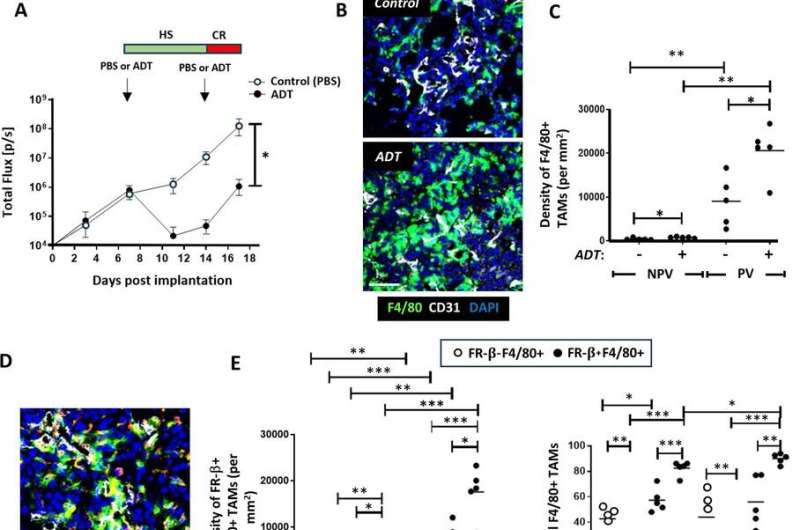This article has been reviewed according to Science X's editorial process and policies. Editors have highlighted the following attributes while ensuring the content's credibility:
fact-checked
peer-reviewed publication
trusted source
proofread
New hope for prostate cancer: New form of immunotherapy could prevent resistance to hormone therapy

A new form of immunotherapy using innovative nanoparticles can delay resistance to hormone therapy and help men with prostate cancer live longer.
Researchers from the University of Sheffield have published findings from study that shows a new form of immunotherapy could give men much more time before their cancer becomes resistant to hormone therapy.
For thousands of men diagnosed with prostate cancer, androgen deprivation therapy (ADT) is a powerful first-line treatment. Although initially effective in limiting the growth and spread of cancer, in some men their tumors develop resistance to this treatment, so their cancer spreads further throughout the body, becoming incurable.
Immunotherapy has had huge success in other cancers—offering long-term cures for previously untreatable cancers. However, this success has not translated to prostate cancer, and a huge focus of research has been to understand why.
The team used cutting edge–techniques to study how immune cells function within prostate tumors, especially after ADT, leading to the development of an entirely new way to deliver immunotherapy. Published in the Journal for Immunotherapy of Cancer, their study is the first to show that carefully designed nanoparticles can be used to stimulate immune cells called T cells to attack cancer cells. They found that this markedly delays the onset of resistance to ADT.
Professor Claire Lewis, from the University of Sheffield's School of Medicine and Population Health, who led the study, said, "The onset of resistance to hormone therapy is a major clinical problem when it comes to treating men with prostate cancer as their tumors then start to regrow and spread. Once this happens, their disease is difficult to treat and harsher treatments like chemotherapy have to be used.
"Until now, immunotherapies for prostate cancer have been disappointing, with few men responding well to treatment. Carefully analyzing the way that immune cells in prostate tumors are inhibited by hormone treatment helped us to develop a way to overcome this, and prevent resistance to hormone therapy.
"We're excited by the potential of this new form of immunotherapy to enhance the response of prostate tumors to hormone treatment. We are now working with our clinical colleagues to explore ways to take this forward into clinical trials as soon as possible."
Through their analysis, the research team discovered that a type of white blood cell called a macrophage accumulates in large numbers around blood vessels in prostate tumors during ADT. They then developed a way of using novel nanoparticles to selectively deliver a drug to these cells that makes the macrophages express a potent immunostimulant called interferon-beta. When this is released inside tumors, it stimulates other immune cells called T cells to kill cancer cells and this delays treatment resistance.
Dr. Hayley Luxton, Research Impact Manager at Prostate Cancer UK, said, "Over 12,000 men die from prostate cancer each year in the UK, and we desperately need new and more effective treatments.
"Immunotherapy has completely changed the way other cancers are treated, but we haven't yet seen anything even close to that success for men with prostate cancer.
"We're thrilled to have funded this research which shows a new form of immunotherapy can give men much more time before their cancer becomes resistant to hormone therapy.
"It will be really exciting to see how it performs in future clinical trials, and we hope it will play a pivotal role in finally unlocking the potential of immunotherapy for men with prostate cancer."
This research supports the University of Sheffield's cancer research strategy. Through the strategy, the University aims to prevent cancer-related deaths by undertaking high quality research, leading to more effective treatments, as well as methods to better prevent and detect cancer and improve quality of life.
More information: Haider Al-janabi et al, Targeting a STING agonist to perivascular macrophages in prostate tumors delays resistance to androgen deprivation therapy, Journal for ImmunoTherapy of Cancer (2024). DOI: 10.1136/jitc-2024-009368




















